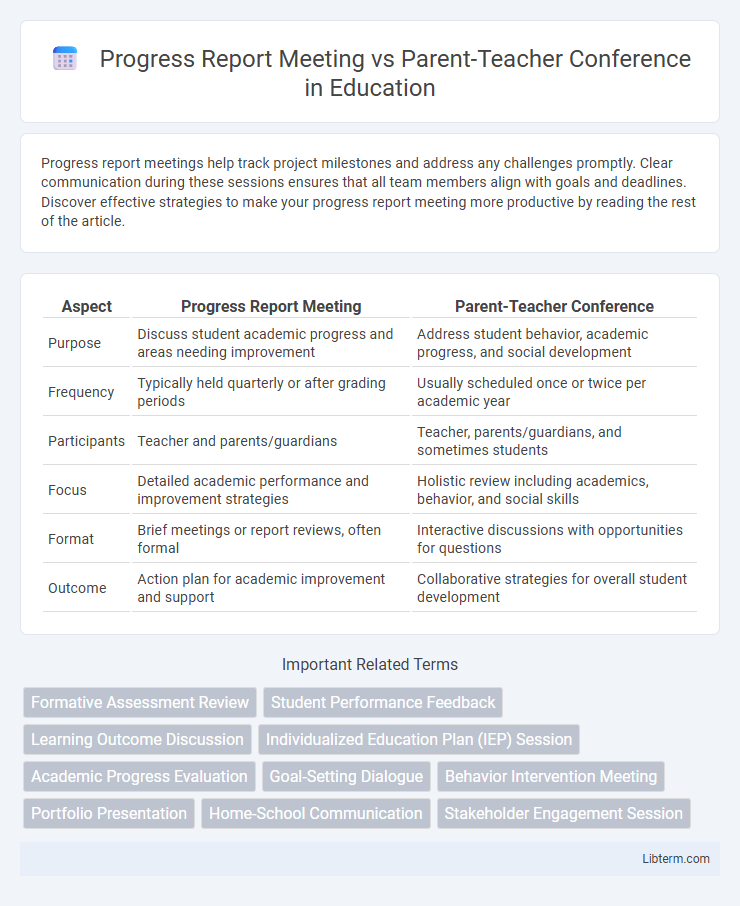Progress report meetings help track project milestones and address any challenges promptly. Clear communication during these sessions ensures that all team members align with goals and deadlines. Discover effective strategies to make your progress report meeting more productive by reading the rest of the article.
Table of Comparison
| Aspect | Progress Report Meeting | Parent-Teacher Conference |
|---|---|---|
| Purpose | Discuss student academic progress and areas needing improvement | Address student behavior, academic progress, and social development |
| Frequency | Typically held quarterly or after grading periods | Usually scheduled once or twice per academic year |
| Participants | Teacher and parents/guardians | Teacher, parents/guardians, and sometimes students |
| Focus | Detailed academic performance and improvement strategies | Holistic review including academics, behavior, and social skills |
| Format | Brief meetings or report reviews, often formal | Interactive discussions with opportunities for questions |
| Outcome | Action plan for academic improvement and support | Collaborative strategies for overall student development |
Introduction: Understanding School Communication Methods
Progress report meetings focus on detailed academic updates and individualized student progress, presenting teachers' assessments of strengths and areas for improvement. Parent-teacher conferences offer a broader platform for discussing overall student development, behavior, and social skills, fostering collaborative relationships between families and educators. Both communication methods serve critical roles in enhancing student outcomes through regular, effective dialogue.
Defining Progress Report Meetings
Progress Report Meetings serve as structured opportunities for educators to share detailed updates on a student's academic performance, behavior, and skill development with parents or guardians, typically occurring mid-term. These meetings emphasize ongoing progress rather than final grades, enabling early identification of challenges and collaborative goal setting to support student growth. Unlike Parent-Teacher Conferences, which often focus on summarizing end-of-term results and broader issues, Progress Report Meetings prioritize timely feedback and action plans to enhance learning outcomes.
What is a Parent-Teacher Conference?
A Parent-Teacher Conference is a scheduled meeting where parents and teachers discuss a student's academic performance, behavior, and social development in detail, providing personalized feedback and strategies for support. Unlike a Progress Report Meeting, which often focuses on reviewing recent grades and assignments, the Parent-Teacher Conference emphasizes a more comprehensive dialogue about the student's overall growth and challenges. This conference fosters collaboration between parents and educators to create tailored plans that enhance the student's learning experience.
Key Objectives: Progress Report Meeting vs Parent-Teacher Conference
Progress Report Meetings focus on evaluating student academic performance through detailed progress reports, facilitating data-driven discussions between teachers and school administrators. Parent-Teacher Conferences prioritize direct communication between parents and teachers to address student behavior, social development, and academic challenges, fostering collaborative support strategies. Both meetings aim to enhance student success but differ in participants and emphasis on quantitative progress versus holistic development.
Participants Involved in Each Meeting Type
Progress report meetings primarily involve teachers and school administrators reviewing student academic performance and behavioral progress, often without direct parent involvement. Parent-teacher conferences typically include teachers and parents or guardians, facilitating direct communication about the student's strengths, challenges, and development. In some cases, students may also participate in parent-teacher conferences to provide personal insights and foster self-advocacy.
Frequency and Timing of Meetings
Progress report meetings typically occur more frequently, often quarterly or bi-monthly, to provide ongoing updates on student performance and address immediate concerns. Parent-teacher conferences are usually scheduled less often, commonly once or twice per academic year, aligning with key assessment periods to discuss overall progress and set goals. The timing of progress report meetings allows for timely interventions, whereas parent-teacher conferences offer comprehensive evaluations at strategic points in the school calendar.
Communication Style: Formality and Structure
Progress report meetings typically involve a formal communication style characterized by structured presentations of student performance data, detailed analysis, and predetermined agendas. Parent-teacher conferences often adopt a more conversational and flexible communication approach, promoting two-way dialogue and personalized discussions tailored to individual student needs. The formality in progress report meetings ensures comprehensive coverage of academic progress, whereas parent-teacher conferences prioritize relational engagement and immediate feedback.
Outcomes and Follow-Up Actions
Progress report meetings emphasize evaluating student performance through data-driven insights, fostering goal-setting for academic improvement. Parent-teacher conferences focus on personalized communication to address student behavior, social development, and tailored support strategies. Both formats prioritize clear follow-up actions, such as targeted interventions, resource allocation, and collaborative monitoring to enhance student success.
Pros and Cons of Progress Report Meetings
Progress Report Meetings offer timely updates on student performance, enabling early identification of academic challenges and facilitating targeted interventions. They provide a focused, data-driven discussion centered on specific progress metrics but may lack the comprehensive, holistic insights typically shared during Parent-Teacher Conferences. However, the limited duration and less personal interaction in Progress Report Meetings can reduce opportunities for in-depth dialogue and relationship building between parents and teachers.
Choosing the Right Approach for Student Success
Progress report meetings provide ongoing assessment insights and help identify areas needing improvement, while parent-teacher conferences focus on comprehensive discussions about student development and goal setting. Selecting the right approach depends on the urgency of academic issues, the level of parental involvement, and the need for collaborative strategies to support student success. Effective communication during either format ensures tailored interventions and fosters a strong partnership between educators and families.
Progress Report Meeting Infographic

 libterm.com
libterm.com